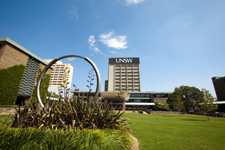Adv Mathematics / Computer Sci - 3946
Program Summary
Faculty: Faculty of Science
Contact: www.science.unsw.edu.au
Campus: Sydney
Career: Undergraduate
Typical UOC Per Semester: 24
Min UOC Per Semester: 6
Max UOC Per Semester: 24
Min UOC For Award: 240
UAC Code: 429331
Domestic Entry Requirements: See Domestic Entry Requirements
International Entry Requirements: See International Entry Requirements
Award(s):
Bachelor of Science (Advanced Mathematics)
View program information for previous years
Program Description
The Advanced Mathematics and computer science degrees lend themselves well to each other. While the advanced mathematics degree focuses on an in-depth understanding of pure and applied mathematics, the computer science degree looks at the design, construction and uses of computer systems. Your mathematics study will assist with the manipulation of data as well as the development of algorithms in computer science. There is no better degree to combine your passion for mathematics as well as computer systems.
For admission to the program, students must satisfy the entry requirements to both the Bachelor of Science (Advanced Mathematics) (3986) and the Bachelor of Science (Computer Science) (3978) programs.
For questions relating to the Bachelor of Science (Advanced Mathematics) component of the program, students should consult the School of Mathematics & Statistics. For questions regarding the Bachelor of Science (Computer Science) requirements for the program, students should consult staff in the School of Computer Science and Engineering Student Office.
Program Objectives and Graduate Attributes
Program Structure
Where the requirements for the two programs are completed in less than 240 units of credit due to overlapping courses, students must make up the remaining units of credit from the Faculty of Science or the School of Computer Science and Engineering.
|
Advanced Mathematics Component
|
144 UOC
|
* An approved Bachelor of Science (Advanced Mathematics) major; and
* SCIF1121 or SCIF1131; and
* 48 units of credit Honours Year; and
* Science elective courses ('Science' courses are defined on program 3986.)
|
|
Computer Science Component
|
96 UOC
|
* Meet all of the program requirements for the Bachelor of Science (Computer Science) 3978 except for the 12 units of credit General Education requirement and 36 units of credit of Free Electives
|
When taken as part of a dual degree, a Bachelor of Science (Advanced Mathematics) is comprised of 144 units of credit which includes:
- An approved major from the Bachelor of Science (Advanced Mathematics) program; and
- SCIF1121 or SCIF1131; and
- 48 units of credit Honours Year; and
- Science elective courses, if required.
1. Students must complete a minimum of 144 units of credit;
2. Students must complete exactly one approved Bachelor of Science (Advanced Mathematics) major, and this must be declared before enrolling in Level III courses;
3. SCIF1121 Advanced Science: Professional Perspective and Practice (6 UOC) or SCIF1131 Science: Technological and Professional Perspectives (6 UOC) must be completed in Stage 1.
4. An Honours Year of 48 units of credit must be completed. For information regarding the admission requirements and application process for honours, please see the information under 'Honours';
5. In addition to the courses required for a student's chosen major, SCIF1121/1131, and Honours, students must take 'science' courses so that the major plus SCIF1121/1131, plus Honours year plus 'science' courses total 144 units of credit. "COMP" courses cannot be counted as ’science’ courses to fulfil this requirement.
6. Students must complete at least 24 units of credit of 'Science' Level I courses;
7. A minimum of 30 units of credit of Level III 'science' courses must be completed;
8. No student may commence Level II courses until 30 units of credit of Level I courses have been successfully completed.
9. Students may commence Level III courses upon successful completion of 72 units of credit.
10. Progression to stages 2, 3, and 4 is subject to academic performance. Students will be required to attain a weighted average mark (WAM) of 70 in each semester. Where students do not maintain this minimum level of academic performance, they will be transferred to the Bachelor of Science program.
Students wishing to complete a major in Quantitative Risk, should note that this is a large multi-disciplinary major, and when taken in a dual degree program where there is little or no overlap of courses with the other degree program, may involve extra time and cost to complete, and may have visa implications for international students. Please contact the School of Mathematics & Statistics if you are considering undertaking the Quantitative Risk major.
Requirements for the Bachelor of Science (Computer Science) in dual degree mode are as follows:
- Core Computer Science (36 UOC)
- MATH1141 Higher Mathematics 1A OR MATH1131 Mathematics 1A
- MATH1241 Higher Mathematics 1B OR [[MATH1231 Mathematics 1B
- MATH1081 Discrete Mathematics
- Computer Science Electives (12 UOC)
- Level 3/4 Computer Science Electives (30 UOC)
The flexibility of the Computer Science Program allows specialisations within the program such as Robotics and Computer Games. Hence a student may use some of the Core Computer Science courses and electives to specialise in up to two of the following areas:
- COMPA1 Computer Science (Compulsory)
- COMPG1 Computer Game Design & Construction
- COMPI1 Artificial Intelligence
- COMPH1 Human Computer Interaction
- COMPR1 Robotics
- COMPE1 Electronic Commerce
- COMPN1 Computer Networks
- COMPD1 Database Systems
Honours
For details about Honours in the Bachelor of Science (Advanced Mathematics) please see 3986 Bachelor of Science (Advanced Mathematics).
Honours (optional) in the Bachelor of Science (Computer Science) Component
Students undertaking the BSc (CompSci) in Dual Award mode may apply to complete an additional year (48 UoC) of study for the award of Honours. For details of Honours please see 4515 Bachelor of Science (Honours) Computer Science.
Academic Rules
Fees
Area(s) of Specialisation









